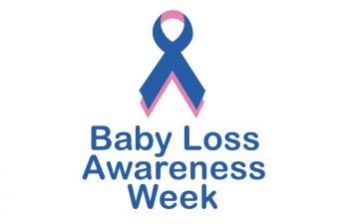Broadcast: News items
Baby Loss Awareness Week (9-15 October)
By: Shona Luton
Last updated: Monday, 20 October 2025

Reflect for a second - have you ever heard any whispered conversations or a passing comment about someone in your family whose baby died shortly after birth? A colleague in your team who miscarried early? A friend who tried for many years but ultimately was never able to have a baby?
Now take a moment to think how much did you really know or understand about what happened to those people - about their baby, their grief or the ongoing impact of their loss? The answer may be a lot, but I suspect that it may be very little.
For many, baby loss remains a deeply personal and unspoken grief, one that is very much still shrouded in taboo. The effect of which only amplifies misunderstandings around the subject, and feelings of isolation and shame for those who are directly impacted.
This makes it all the more important how we respond to baby loss in the workplace, as line managers or colleagues. A supportive and understanding environment can have a real meaningful impact on people’s chance of recovery and wellbeing.
here are some ideas for supporting people at work who have been through baby loss:
1. Learn about different forms of baby loss. This can reduce well-intentioned but sometimes hurtful assumptions and language. Baby loss includes:
- ectopic pregnancies
- miscarriages (early, late, recurrent)
- stillbirth
- medical termination
- neonatal death
- infertility and many more.
Please be aware that these are medical terms that often don’t go nearly far enough to explaining what has happened to someone – it’s best to listen to the individual’s choice of words to describe their experience and use these.
2. Take cues from the person. Do they want to talk and discuss what’s happened or would they rather focus on work related practicalities? Bear in mind, this may change depending on different contexts or at different times.
3. Have they named their baby? If so, try to use their baby’s name if you can – you may be the only person in their life that does!
4. Look at workload and think about the physical and emotional impacts of baby loss. As well as grief and bereavement support, many people have to return to work after having given birth or having had painful miscarriages without access to maternity rights – the impact on the body is huge and often unrecognised. Can policies be flexible? Can you adjust their workload? Can you continue to check in on their progress and how they’re settling back in?
5. Curiosity is key! People can assume nothing but trauma comes from baby loss and this can result in a lot of palpable fear when it is mentioned. In fact, if appropriate, asking open and sensitive questions can lead you to find that in many cases so much love, connection and strength can come from these circumstances. Every situation is different and nuanced!
6. Finally, feel free to signpost the charities, support and further information below:
Charities
- SANDS stillbirth and neonatal death charity offers a local meetup in person on their Worthing & Brighton Facebook Group
- ARC offers bereavement support and advice for medical terminations. Visit the ARC website.
- The Miscarriage Association. Visit the Miscarriage Association website.
- Tommy’s pregnancy and baby charity website has baby loss support section, including a Black and Black-Mixed Heritage helpline and exercise/ wellbeing programme post-baby loss. Visit the Tommy's website.
- Black Baby Loss Awareness Week is 11-17 May 2026. Find out more on their Instagram page.
- Request a baby loss certificate for people who have experienced loss before 24 weeks on the UK Government website.
- Baby Loss Awareness Week includes Wave of Light events. Visit the Baby Loss Awareness website.
Support
Additional support for staff is available on the University's Staff Wellbeing Hub. Compassionate leave is available for those who have experienced pregnancy loss - find out more in our Guidance on Leave and Absence from Work [PDF].
Listening
Listen to an episode of the Griefcast podcast featuring Charlotte Bennett and Illy. It's a great episode full of humour where the interviewee and their niece talk about how to talk about baby loss, what we can learn from how children talk about grief and why it’s so important.
The ARC hosts a podcast series featuring people with experience of medical terminations.
Reading
- Adrift: On (in)Fertility, Uncertainty and the Wilderness of the Body by Miranda Ward, on infertility, IVF and miscarriage
- Life after baby loss by Nicola Gaskin, on support for any form of baby loss
- A Heart that Works by Rob Delaney on infant loss
- The Brink of Being: Talking about Miscarriage by Julia Bueno, a medical journalist's engaging research on all forms of miscarriage.

